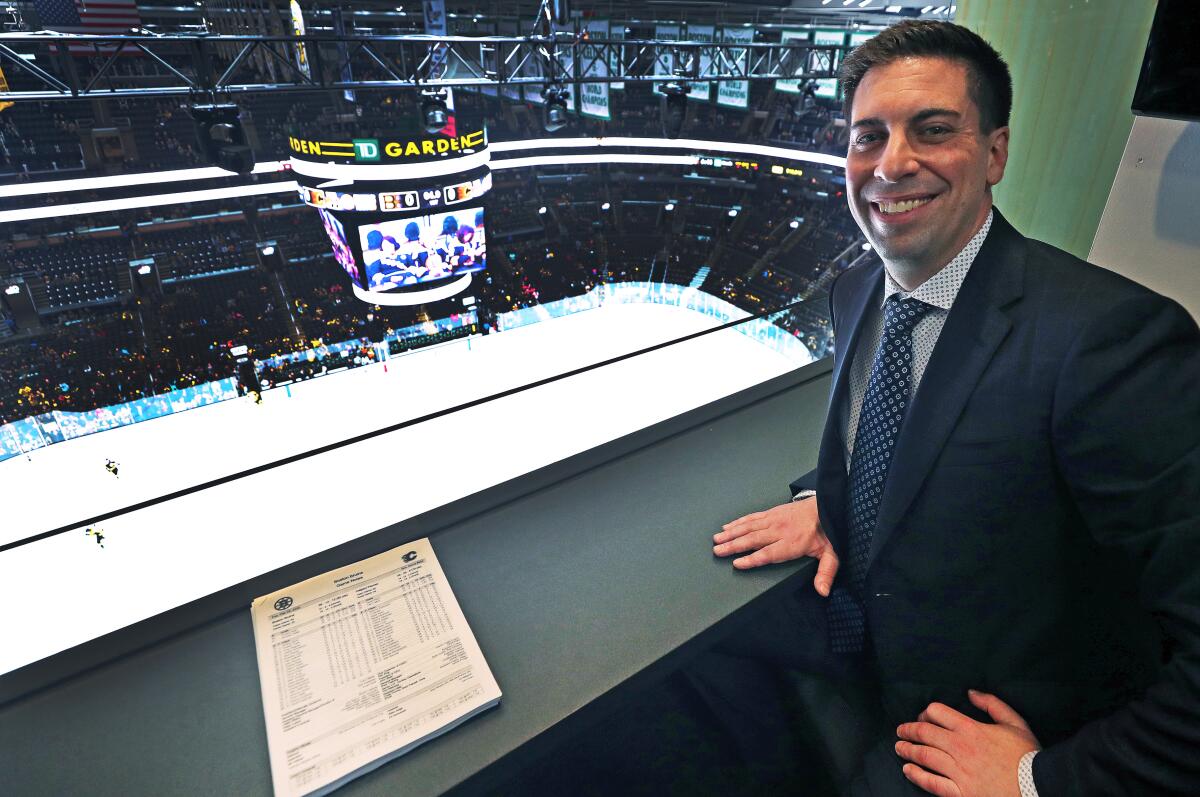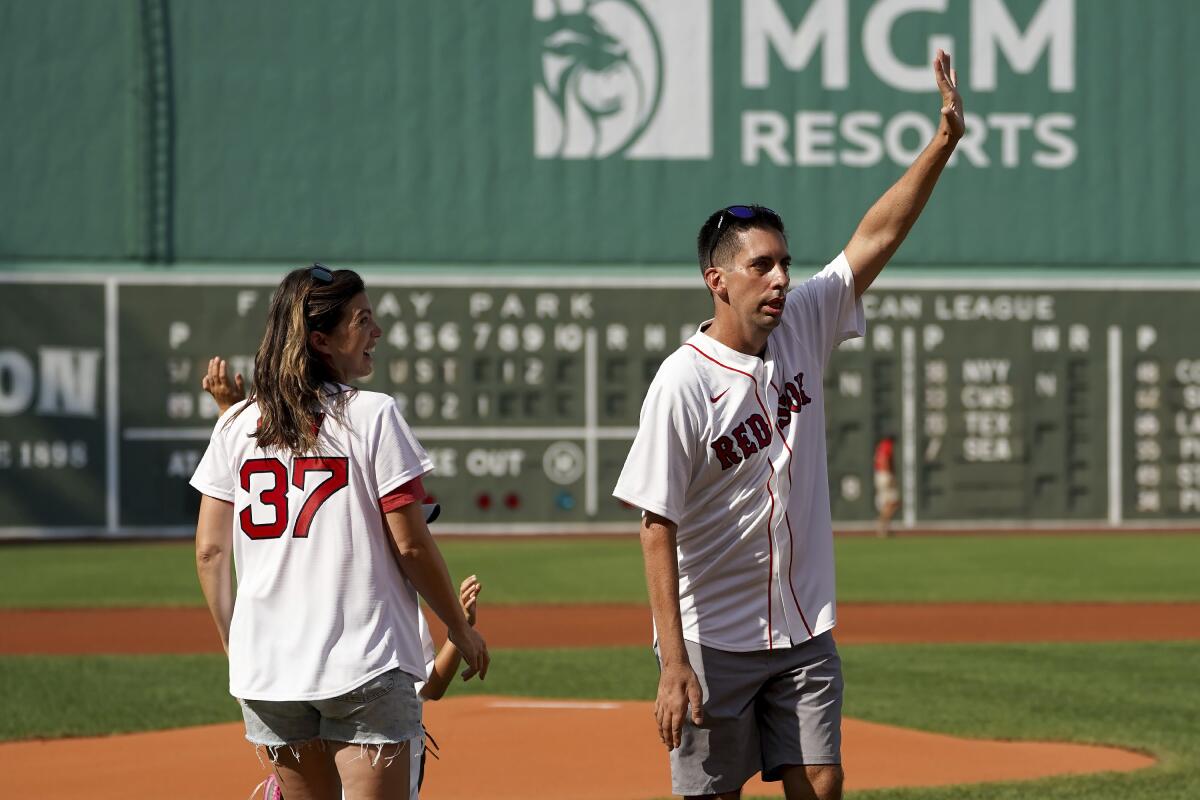NHL exec Chris Snow, who died after ALS battle, continues to inspire

- Share via
A year into a journey that doctors told him would end quickly and cruelly — because the aggressive form of amyotrophic lateral sclerosis that was attacking the nerve cells in his brain and spinal cord and would rob him of his ability to move, speak and breathe — Chris Snow wasn’t just living. He was vibrantly alive.
ALS, popularly known as Lou Gehrig’s disease, runs in Snow’s family. It had taken the life of his father, Bob, in nine months. It had taken the life of two uncles and a cousin. It has no cure.
But Snow’s early enrollment in a clinical gene therapy trial had produced amazingly good results. He lost the use of his right hand, but he taught himself to throw left-handed. He could still play catch with his son, Cohen, and do push-ups with his daughter, Willa, riding his back.

A year after his dismal 2019 diagnosis, he was rollerblading. Skating. Going to work as the assistant general manager of the Calgary Flames, whose data and statistical operations he had refined with great precision and even greater passion for the sport and the people behind the numbers. He could walk into a room, he said in a 2020 interview, and people unaware of his diagnosis wouldn’t have known it from the way he walked or talked.
Snow, who had started out as a sportswriter and was an intern at The Times in 2003 before he changed course to take executive positions with the Minnesota Wild (which involved a pay cut) and later with the Flames, dared to hope the experimental drug therapy would slow the progression of the disease and the weakening of his muscles. Maybe he’d be the first ALS survivor.
He lost his brilliant beaming smile, but he never lost hope. It was hope that kept him going as much as the drug, tofersen.
“If we went back to a year ago and you painted this scene for me today, I would be in tears because I would be elated,” he said in June of 2020. “The mental challenge now is I’ve seen these benefits and I get greedy. I want it all. I want this to last 40 more years, or more.”
He got the gift of a few more years to see his kids grow, to watch them play hockey on the ice and in the family basement. The disease continued to erode his quality of life, but he fought off two significant health scares late last year, surprising his doctors by being able to breathe on his own after he had been put on a ventilator in December.
Calgary Flames executive Chris Snow was given six to 18 months to live when diagnosed with ALS a year ago. An experimental drug has provided optimism.
This summer, he was able to spend some golden days at the lake with his family. Despite having little function in his hands and arms, he managed to push a lawn mower around his beloved garden in July.
Sadly, he didn’t get those 40 years or anything close to that.
Snow, 42, became unresponsive and went into cardiac arrest last week. The resulting loss of oxygen to his brain was catastrophic, according to his wife, Kelsie Snow, a gifted writer who was a Times summer intern in 2004 (as Kelsie Smith) and has eloquently shared the family’s experiences on her blog, Kelsie Snow Writes, and her searingly honest podcast, “Sorry, I’m Sad.”
Doctors confirmed he would not wake up, and he was kept alive long enough to arrange organ donations. He died Saturday, a little more than four years after he was diagnosed.
“Today we hugged Chris for the last time and said goodbye as he went to give four people the gift of life by donating his kidneys, liver and lungs,” Kelsie Snow wrote Saturday on X, formerly known as Twitter.
“We are deeply broken and deeply proud. In life and in death, Chris never stopped giving. We walk forward with his light guiding us.”

His light was extinguished way too soon.
Together, Chris and Kelsie became advocates for ALS patients and raised funds for research into ALS treatments and potential cures. They believed that if the drug he was using didn’t turn out to be the cure, maybe another drug or treatment funded by donations he had inspired will someday lift the death sentence imposed on ALS patients.
Chris believed his treatment was made possible by research funded by donations made during the 2014 Ice Bucket Challenge, in which people dumped chilly water on themselves or friends and posted videos to social media with a challenge to support ALS-related causes. Five years later, the ALS Assn. reported it had been able to increase its global research funding by 187% thanks to the success of the Ice Bucket Challenge. Snow has more than paid that favor forward. His selflessness is only part of the legacy he leaves for 12-year-old Cohen and 9-year-old Willa.
“The only way out of the dark parts of life is through them,” Kelsie Snow said during one of her podcast episodes. As he got through the dark, Chris Snow left plenty of light for those who will follow.
More to Read
Go beyond the scoreboard
Get the latest on L.A.'s teams in the daily Sports Report newsletter.
You may occasionally receive promotional content from the Los Angeles Times.











